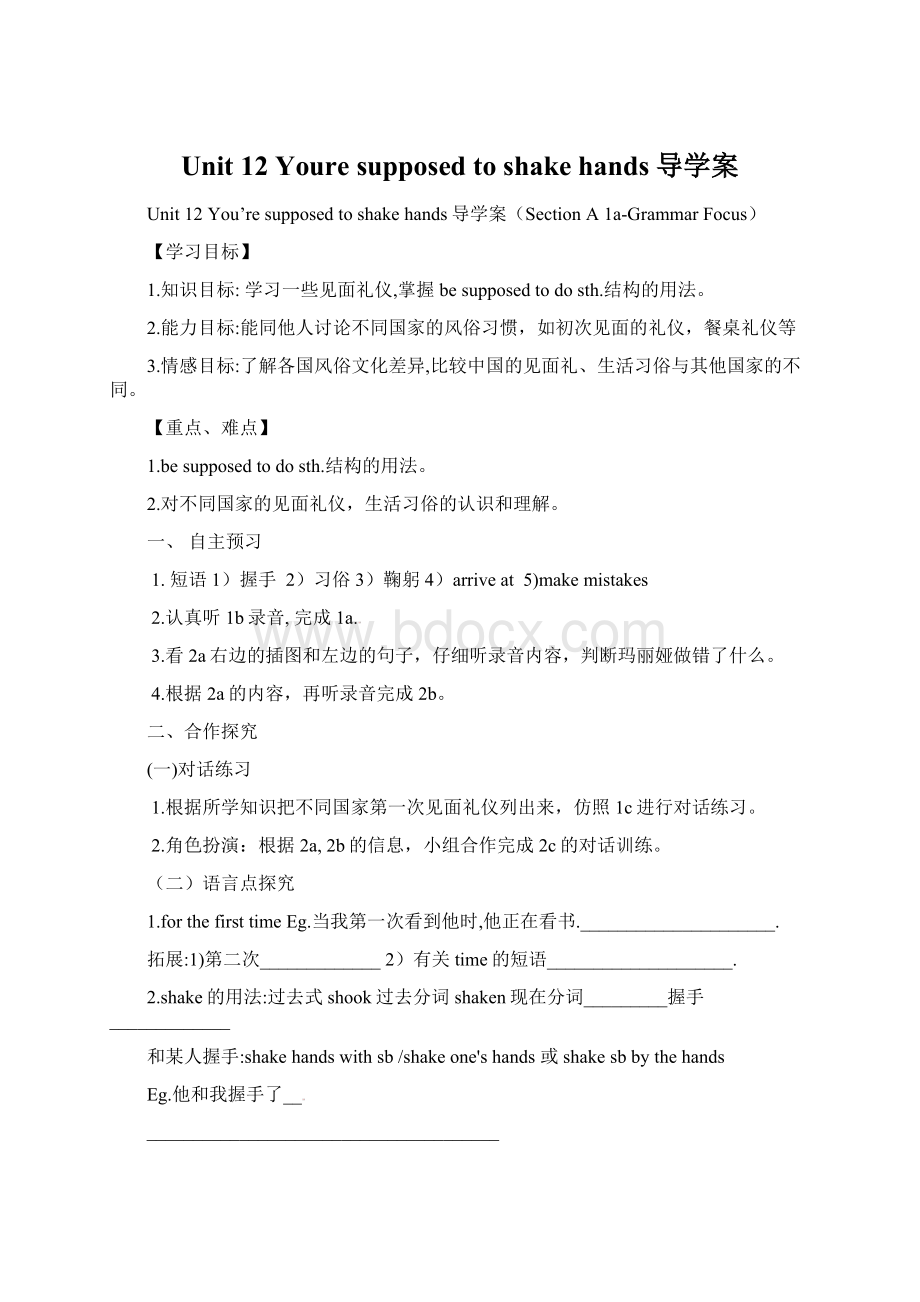 Unit 12 Youre supposed to shake hands导学案.docx
Unit 12 Youre supposed to shake hands导学案.docx
- 文档编号:8851077
- 上传时间:2023-02-02
- 格式:DOCX
- 页数:20
- 大小:46.44KB
Unit 12 Youre supposed to shake hands导学案.docx
《Unit 12 Youre supposed to shake hands导学案.docx》由会员分享,可在线阅读,更多相关《Unit 12 Youre supposed to shake hands导学案.docx(20页珍藏版)》请在冰豆网上搜索。

Unit12Youresupposedtoshakehands导学案
Unit12You’resupposedtoshakehands导学案(SectionA1a-GrammarFocus)
【学习目标】
1.知识目标:
学习一些见面礼仪,掌握besupposedtodosth.结构的用法。
2.能力目标:
能同他人讨论不同国家的风俗习惯,如初次见面的礼仪,餐桌礼仪等
3.情感目标:
了解各国风俗文化差异,比较中国的见面礼、生活习俗与其他国家的不同。
【重点、难点】
1.besupposedtodosth.结构的用法。
2.对不同国家的见面礼仪,生活习俗的认识和理解。
一、自主预习
1.短语1)握手2)习俗3)鞠躬4)arriveat5)makemistakes
2.认真听1b录音,完成1a.
3.看2a右边的插图和左边的句子,仔细听录音内容,判断玛丽娅做错了什么。
4.根据2a的内容,再听录音完成2b。
二、合作探究
(一)对话练习
1.根据所学知识把不同国家第一次见面礼仪列出来,仿照1c进行对话练习。
2.角色扮演:
根据2a,2b的信息,小组合作完成2c的对话训练。
(二)语言点探究
1.forthefirsttimeEg.当我第一次看到他时,他正在看书._____________________.
拓展:
1)第二次_____________2)有关time的短语____________________.
2.shake的用法:
过去式shook过去分词shaken现在分词_________握手_____________
和某人握手:
shakehands with sb/shake one's hands或shakesbbythehands
Eg.他和我握手了__
______________________________________
3.bow的用法:
向某人鞠躬/低头 可表示为:
bowtosb.Eg.不要向失败(failure)低头__________________
4.辩一辨:
besupposedto与should
besupposed是suppose一词的语态结构。
后接动词不定式时,含义相当于should后接不定式。
should后面的不定式要省略不定式符号to,即动词,且属于语态形式,使用起来较严肃和正式;
而besupposedtodosth的使用较随便,建议性强。
否定式为benotsupposedtodosth.
如:
Youarenotsupposedtoshakehands.=Youshouldn’tshakehands.你不应与之握手。
三、反馈检测
1.InJapan,thepeoplearesupposedto_________(鞠躬)whentheymeetforthetime.
2.It's not polite ____________(亲吻) the others in public in China.
3.I was supposed to arrive at 8:
00, but I (到达)at 9:
00.
4.WhenwemeetAmericansforthefirsttime,weshould_________(握手)withthem.
5.You must know some __________(习俗) beforeyou go to some foreign countries.
四、作业布置:
单项选择
1. Jim stood up and shook hands _______ both of them.A. by B. with C. for D. to
2. Chinese never bowed
____________the enemiesA. in B. to C. on D. with
3.John_______Beijingthedaybeforeyesterday.A.arrivedatB.arrivedC.reachedtoD.arrivedin
4.You________standinlinewhenwaitingforthebus.A.mustn’tB.can’tC.aresupposedtoD.don’t
5.She_______some_______inhercompetitionyesterday.
A.hasmade;mistakesB.made;mistakesC.hadmade;mistakeD.wasmistaking;mistakes
6.PeopleinChina________whentheymeetforthefirsttime.A.bowB.kissC.shakehandsD.laugh
7.Tokeepsafe,driversaren’tsupposedtodrinkbeforedriving.
A.aren’twillingtoB.shouldn’tC.aren’tsuretoD.don’thaveto
8.—Ithinkyoushould________yourhomework,right?
—Sorry,sir.Ihaven’t.A.finishB.finishedC.finishingD.havefinished
9.Ifyouarrive_______late,Idon’tmind.A.littleB.abitofC.alittlebitofD.abit
10.Whatshouldyoudowhenyoumeetsomeone________thefirsttimeinEngland
A.forB.inC.atD.with
Unit12You’resupposedtoshakehands导学案(SectionA3a-4)
【学习目标】
1.知识目标:
掌握重点词汇和句型的运用,掌握besupposedtodosth.结构的用法。
2.能力目标:
通过“应该”或“不应该”进一步了解一些国家的礼仪和对时间的看法。
3.情感目标:
了解各国风俗文化差异,比较中国的见面礼、生活习俗与其他国家的不同。
【重点、难点】
了解一些国家的礼仪和对时间的看法及重点词汇和句型的运用。
一、自主预习
1.词汇
1)Colombia2)Switzerland3)放松的4)国家,土地
5)对于,关于6)问候7)顺便拜访8)毕竟,终究
2.认真阅读3a的文章,完成课本上的表格。
二、合作探究
(一)对话练习
1.角色扮演:
小组合作完成3b的对话练习。
2.角色扮演;小组合作先完成课本上的表格里的内容,再进行对话表演。
(二)语言点探究
1.WhereI’mfrom,we’reprettyrelaxedabouttime.在我的国家,我们对时间的要求非常宽松。
1)“WhereI’mfrom”,“在我来的地方”,是地点状语从句。
地点状语从句是指用一个句子作主语的地点状语,常由连词where引导。
如:
Ifoundmypen_______________.我在丢失钢笔的地方找到了它。
2)relaxv.使……放松.形容词为修饰物的_________和修饰人的__________.
如:
Softmusicisakindof_________music,anditoftenmakesme__________.
2.Spendingtimewithfamilyandfriendsisveryimportanttous.
1)“spendingtimewithfamilyandfriends”是动名词短语作主语。
动名词短语作主语谓语动词用_______数。
如:
在阳光下看书对眼睛不好。
_________thesun______badforyoureyes.
2)sth.beimportanttosb.谋事对某人重要。
学好英语对我们来说是很重要的。
.
3.Weoftenjustdropbyourfriends.我们只是顺便拜访一下我们的朋友。
1)drop作名词是“滴,水滴”。
如:
一滴水___________.
2)作动词是“滴下,落下,放弃”。
不要放弃数学,因为它很重要。
Don’t________math,foritisvery_________.
3)词组归纳:
dropby/in__________=__________,dropbehind_________,dropoff_______
4.We’rethelandofwatches,afterall.毕竟,我们是钟表的王国。
1)watch作名词时,“表”,其复数为__________;作动词时,意为__________.
2)afterall“毕竟,终究”.置于句首,提示或强化可能被忽略的事实或论点,作为说服对方的理由;置于句末,表示语气上的转折。
如:
(1)我们应该努力学习,毕竟我们不再是孩子了。
We’re____to______hard._________,We’re________children.
(2)我累了,然而我终于到家了。
Iwas_____,_______Igothome____________.
三、反馈检测(用所给词的适当形式填空)
1.Youcanfind
some_________(rule)abouttime.2.Wenevervisitafriend’shousewithout_______(call)first.
3._____(spend)timewithfamilyisnecessarytous.4.Whenyouare_______(invite),youshouldn’tbelate.
5.WhereI’mfrom,we’repretty_______(relax)abouttime6.Wemustfindplaces_________(study).
四、作业布置
1.Let’sgo_______Jimis.A.whatB.whoC.howD.where
2.Weoften______ourfriends’homesatweekends.A.droparoundB.dropoffC.dropdownD.dropby
3.Itisnotpolitetogetintoaroomwithout________first.A.knockingB.toknockC.knockedD.knock
4.Sheoftenmakesplans____others.A.helpsB.helpingC.tohelpD.help
5.Theideaof“sunshinesport”makesitpossibleforkidstochooseanddo_______aboutsportaslongasonehoureveryday.A.pleasantsomethingB.anythingpleasantC.nothingpleasantD.pleasantanything
6.Doyouthink____usefultolearnaforeignlanguage?
A.thatB.itC.thisD.they
7._______isveryfunny.A.GoinghikingB.GoinghikeC.TogohikeD.Togoinghike
8.Thisinterestingbookonly______metenyuanandI_______tenmonthreadingit.
A.cost,spendB.cost,spentC.spends,costD.spent,costs
Unit12You’resupposedtoshakehands导学案(SectionB1a-2c)
【学习目标】
1.知识目标:
掌握重点词汇和句型的运用,掌握besupposedtodosth.结构的用法。
2.能力目标:
能听懂SectionB,2a,2b的内容,完成相应的练习。
3.情感目标:
对一些国家的风俗习惯和饮食文化、餐桌礼仪的了解,进一步提高对文明生活的认识。
【重点、难点】了解一些国家的风俗习惯和饮食文化、餐桌礼仪,听力技能的提高。
一、自主预习
1.词汇1)Peru2)wipe3)napkin4)pickup
5)makenoise6)pintat7)刺,戳8)粗鲁的
2.根据所学知识或查阅资料独立完成SectionB,1的判断题。
二、合作探究
(一)听力练习
1.2a先看懂四幅图片的内容,然后认真听录音内容,把2a的插图顺序标上。
2.2b先猜猜左边与右边如何搭配,再听录音内容核实自己的猜测是否正确。
3.小组合作完成2c的对话练习。
(二)语言点探究
1.InChina,you’renotsupposedtopickupyourbowltoeat.在中国,你不应该端着碗吃饭。
pick是动词,意为“拾取,挑选,采摘”。
短语pic
kup有“捡起,拾起,(车辆)搭载(某人)或接送(某人)”等意思。
如:
1)Thegirls_____________applesonthefarm.姑娘们正在农场摘苹果。
2)Mycarwill______you______thisafternoon.我的车下午来接你。
3)He______upawallet_______thewaytoschool.他在上学的路上捡到了一个钱包。
2.Youshouldn’tpointatanyonewithyourchopsticks.你不应该用筷子指着任何人。
辩一辩:
pointat,pointto与pointout:
1)point意思为“指着,指向”,在用事物名词作主语时,一般和pointto连用,在用人物名词作主语时,常用pointat.如,Ourteacheristhemaponthewall.我们的老师在指着墙上的地图。
Thelandoftheclocksix.时钟的针指向六。
2)pointat可以分开来理解,也就是point后直接跟名词或代词作宾语,at表示方向,pointto没有这种用法。
3)pointout是“指出“的意思,属于“动副”结构的短语,虽可跟宾语,但若是代词,须放point和out之间。
如,Canyoupointoutthechurchinthispicture?
你能指出这张图画中的教堂吗
三、反馈检测
把下列句中的汉语翻译成英语。
1.InChina,you’renotsupposedto____________(拾取)yourbowltoeat.
2.InBrazil,youshouldwipeyourmouthwithyournapkin___________(每次)youtakeadrink.
3.It’spoliteto_________(发出噪音)whileeatingnoodles.
4.Youshouldn’t_____________(指着)anyonewithyourchopsticks.
5.We’rethelandofwatches,______________(毕竟)
6.Weoftenjust_____________(顺便拜访)ourfriends’homes.
四、作业布置
一、单项填空
1.Thebooksareonthefloor,please________.
A.pickupthemB.lookforthemC.pickthemupD.lookthemfor
2.Ourteacherpoints_________theblackboardandexplains(解释)difficultsentences.A.atB.toC.outD.on
3.Mothersaidangrily,“Iaskyoutosit_______table,nottosit_____thetable.”
A.at;onB.in;inC.at;atD.on;to
4.Wegotoschool________footandeatmeals__________chopsticks.
A.by;byB.with;byC.on;withD.on;use
5.Youaren’tsupposedtoeatordrinkwhile________downthestreet.
A.towalkB.walkingC.walksD.walked
6.Theboyfound_______easytoflykites.A.thatB.itC.thisD.it
’s
7.Tostudents,learninghowtoliveis____important___learninghowtostudy.
A.too;toB.so;thatC.as;asD.notonly;butalso
8.Hesatdownatthetable,putthe____aroundherneckandbegantoeat.A.glassesB.napkinC.forkD.knife
二、用所给单词的正确形式填空
everything,free,they,on,fact,much,hate,with,slow,hour
TheAmericanthinkalotabouttime.Theylearntovaluetime.Aschildren,theyaretaughttobe1timetogotoschool,todoworkandtodo2.Whentheyarehavingagoodtime,theysaythattimeflies.Whenapersonisdying,thenheislivingonborrowedtime.
Timeismoney.Timeisknowledge.TimeiseverythingInAmeri
ca.AworkingAmericanhastoworkhardforeight3aday.Thisisworkingtime.Inhis4time,healsoworkshardfor5money.EvenSaturdayandSundayarefilled6activities.Inthestreetyoucanhardlyseeamanwhowalks7.Theywalkveryfast.In8theyarerunning.Theylovetimebecausetimebrings9money,comfortsandprogress.Butsometimestheyalso10time,fortheyhavebecomeservantsoftheclock.
1._______2.________3.________4._______5.______6.______7._______8.______9.______10.______
Unit12You’resupposedtoshakehands导学案(SectionB3a-4)
【学习目标】1.掌握文中出现的重点词汇和句型结构。
2.学会表达各国饮食起居、生活习俗和对时间的看法。
3.了解各国风俗文化差异,比较中国的见面礼、生活习俗与其他国家的不同。
【重点、难点】
学会表达各国饮食起居、生活习俗和对时间的看法及文中出现的重点词汇和句型结构的运用。
一、自主预习
1.词汇检测:
译一译,读一读,背一背
1)lap2)elbow3)gradually4)particular5)compliment
6)westernrestaurant7)beginwith8)特地(不怕麻烦)做某事
9)使某人感到宾至如归10)餐桌礼仪11)习惯做某事12)餐叉
13)吃饱的14)不熟悉的15)调羹16)刀17)挤满
2.认真阅读3a
的文章,在文章中找到3a的五个问题的答案。
3.小组合作:
完成SectionB,3b和Part4。
二、合作探究(语言点探究)
1.It’sevenbetterthanIth
oughtitwouldbe.它甚至比我想象的好得多。
1)even是程度副词,意为“甚至,更”,用来修饰比较级。
归纳总结:
还可修饰比较级的副词有
。
2)better是_______的比较级,最高级为___________.
2.IwasabitnervousbeforeIarrivedhere…在我到这儿之前有点紧张。
辩一辨:
abit,alittle和afew
1)abit“有点儿,稍许”之意,可用作程度状语修饰形容词或副词,也
- 配套讲稿:
如PPT文件的首页显示word图标,表示该PPT已包含配套word讲稿。双击word图标可打开word文档。
- 特殊限制:
部分文档作品中含有的国旗、国徽等图片,仅作为作品整体效果示例展示,禁止商用。设计者仅对作品中独创性部分享有著作权。
- 关 键 词:
- Unit 12 Youre supposed to shake hands导学案 hands 导学案
 冰豆网所有资源均是用户自行上传分享,仅供网友学习交流,未经上传用户书面授权,请勿作他用。
冰豆网所有资源均是用户自行上传分享,仅供网友学习交流,未经上传用户书面授权,请勿作他用。


 对中国城市家庭的教育投资行为的理论和实证研究.docx
对中国城市家庭的教育投资行为的理论和实证研究.docx
